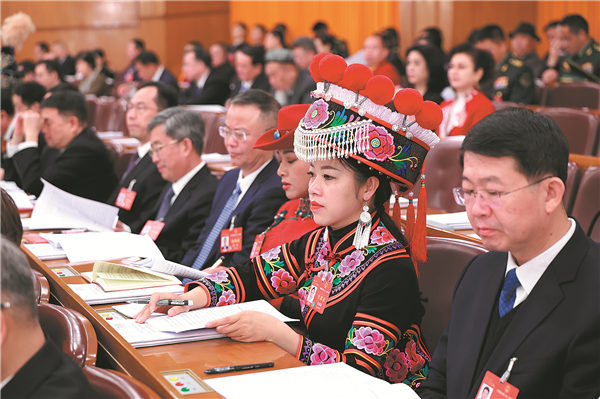

After she returned home, Jin began making innovations and developed creative cultural products with Yi embroidery elements, in addition to making traditional clothing.
Her company has developed three main series of creative cultural products. The first is traditional Yi embroidery patterns; the second uses local green peafowl culture in its designs, and the third combines elements of the culture of Mazu, a sea goddess worshipped in China's coastal areas. The products include souvenirs and articles for daily use, like bags, suitcases and teapots.
According to Wang Yubo, governor of Yunnan province, who spoke at an open panel discussion during this year's two sessions, there is a Yi embroidery boom in Chuxiong, with the number of female embroiderers reaching more than 57,000. Last year, the output value of this business in Chuxiong reached 1 billion yuan.
Jin says there are 583 Yi embroidery enterprises or shops in Chuxiong, and the business has encouraged more young people to return home from cities to be involved in it. Only last year, more than 20 young people came back.
The government has issued a number of policies to support the business. For example, technical standards for the handicraft have been issued. People who open Yi embroidery companies can enjoy a loan with very low interest. Jin says the craft has been combined with tourism so that travelers can feel its charm in an immersive way.
Last year, she got the chance to promote the Yi cultural heritage on a global stage, as she was invited to attend Milan Fashion Week to show clothes decorated with Yi embroidery elements.
"People abroad seemed to like and even respect old embroidery," says Jin, adding that they have signed an order with a British brand to add Yi embroidery elements to their clothes, and many other foreign companies have shown interest in future cooperation.
"The experience also expanded my vision. We want to integrate Western styles into our design and make more new things," says Jin.
As an NPC deputy, she advised further support for the inheritance and development of intangible cultural heritage at this year's two sessions. She also hopes to provide more psychological help for left-behind children whose parents have migrated to cities to work, leaving them in villages with their grandparents.
"I have noticed that some young people in my hometown, without the oversight of parents, may get into trouble. As a result, I hope more attention will be provided for their psychological welfare," says Jin.